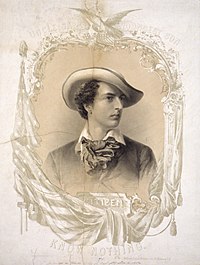Know-Nothing movement
|
American Party
|
|
|---|---|

Citizen Know Nothing: the Know Nothing Party's nativist ideal
|
|
| First Leader | Lewis Charles Levin |
| Founded | 1844 |
| Dissolved | 1860 |
| Split from | Whig Party |
| Succeeded by | Constitutional Union Party |
| Headquarters | New York, New York, U.S. |
| Secret wing | Order of the Star Spangled Banner |
| Ideology |
American nationalism Anti-Catholicism Republicanism Nativism |
| Political position | Right-wing |
| Religion | Protestantism (Temperance) |
| Colors |
Blue, red, white (American colors) |
The Native American Party, renamed the American Party in 1855 and commonly known as the Know Nothing movement, was an American political party that operated nationally in the mid-1850s.
The movement arose in response to an influx of migrants and promised to "purify" American politics by limiting or ending the influence of Irish Catholics and other immigrants, thus reflecting nativist and anti-Catholic sentiment. It was empowered by popular fears that the country was being overwhelmed by German and Irish Catholic immigrants, whom they saw as hostile to Republican values and as being controlled by the Pope. Mainly active from 1854 to 1856, the movement strove to curb immigration and naturalization but met with little success. Membership was limited to Protestant men. There were few prominent leaders, and the largely middle-class membership was divided over the issue of slavery.
Its most prominent leaders were U.S. Representative Nathaniel P. Banks and former U.S. Representative Lewis C. Levin. The American Party nominated former President Millard Fillmore in the 1856 presidential election.
Anti-Catholicism had been a factor in colonial America but played little role in American politics until the arrival of large numbers of Irish and German Catholics in the 1840s. It then reemerged in nativist attacks on Catholic immigration. It appeared in New York politics as early as 1843, under the banner of the American Republican Party. The movement quickly spread to nearby states, using that name or Native American Party or variants of it. They succeeded in a number of local and Congressional elections, notably in 1844 in Philadelphia, where the anti-Catholic orator Lewis Charles Levin was elected U.S. Representative from Pennsylvania's 1st District. In the early 1850s, numerous secret orders grew up, of which the "Order of United Americans" and the Order of the Star Spangled Banner came to be the most important. They merged in New York in the early 1850s as a secret order that quickly spread across the North, reaching non-Catholics, particularly those who were lower middle class or skilled workmen.
...
Wikipedia
